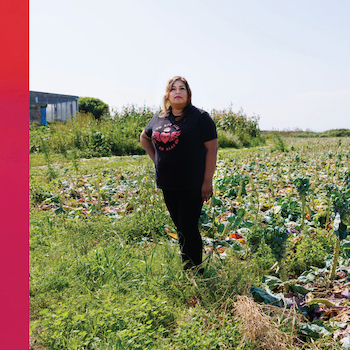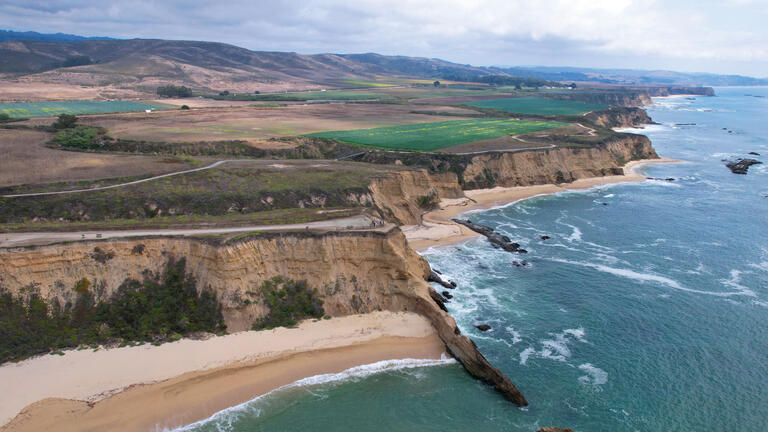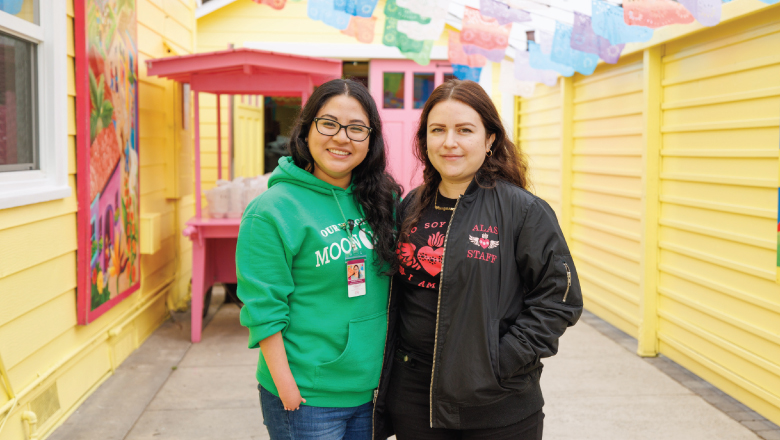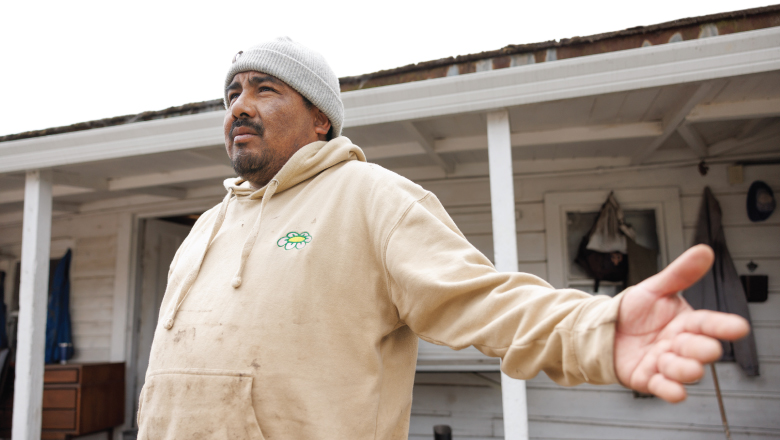

Picking up the Pieces
On the afternoon of Jan. 23, 2023, Belinda Hernandez-Arriaga EdD ’17 was sick at home in Half Moon Bay with what she hoped wasn’t COVID-19.

A little after 2 p.m. that Monday, her phone lit up with calls. There had been a shooting at nearby California Terra Garden, a mushroom farm where a team from her nonprofit had worked earlier that day providing resources and support to farmworkers and their families.
Four people were dead and one injured at the farm. “I got the calls that it was happening, and I remember being sick and putting on my mask and sweatshirt and going out to the site set up for the families to find out what was happening,” says Hernandez-Arriaga, an assistant professor in the USF School of Education.
“Our farmworker team had been there an hour before the shooting.”
By the time Hernandez-Arriaga arrived at the farm, the shooter had moved to another mushroom farm two miles away, Concord Farms. He is accused of fatally shooting three former coworkers there.
All told, seven people were killed and an eighth person was critically injured. One of the victims was an uncle to a member of Hernandez-Arriaga’s staff.
“We knew most of the victims,” Hernandez-Arriaga says. “We work with all the families, the farmworkers on the farms. These were their friends who were killed. They witnessed what happened.”
Hernandez-Arriaga’s nonprofit, Ayudando Latinos a Soñar (ALAS), for more than a decade has provided basic needs including fresh food and financial support for families, health care for farmworkers and their children, and counseling for farmworkers who are struggling with their mental health.
Farmworkers like the alleged shooter, Chunli Zhao, 66. He was arrested at Concord Farms. The San Mateo Sheriff’s Office said a semi-automatic handgun was found in his car. Zhao claimed he had been bullied while working long hours on the farms.
When a supervisor told Zhao he had to pay $100 to repair a forklift damaged at work, Zhao allegedly shot the supervisor and the others, according to San Mateo County District Attorney Steve Wagstaffe. Zhao has pleaded not guilty.
The people killed were Zhishen Liu, 73; Marciano Martinez Jimenez, 50; Aixiang Zhang, 74; Qizhong Cheng, 66; Jingzhi Lu, 64; Yetao Bing, 43; and Jose Romero Perez, 38. Pedro Romero Perez was shot and survived.
Today, 11 months later, the Half Moon Bay farmworker community is still struggling. And so is Hernandez-Arriaga.
“I mean, my heart … I feel like there’s a crack in my heart,” she says.
A Life of Service
Hernandez-Arriaga can relate to farmworkers and their families. She grew up in Edna, Texas, the granddaughter of a farmworker who hauled rice for a living. As a little girl, her mother helped him pick cotton. It was difficult for Hernandez-Arriaga’s family to make a living in the U.S., and when she was 2, they moved to Panama.
Panama was rich in Spanish culture, but there was widespread poverty, she says. The Hernandez family fostered children who were living on the street. There, she learned to help others. “That is what gave me my identity,” Hernandez-Arriaga says.
After six years, the family moved back to Texas, and although Hernandez-Arriaga was a good student, her teachers discouraged her from attending college, she says. “In my mind and my spirit, I was always driven to have an education. I knew education would give me another life that I was hungry for.”
She earned an undergraduate degree from St. Mary’s University in San Antonio, Texas, and went on to earn a master’s degree in social work at Our Lady of the Lake University there. After a professor suggested she pursue a doctorate, Hernandez-Arriaga pledged to her parents that she would earn a doctorate and teach a new generation of students who were first in their families to go to college.
She moved to San Jose and landed what she calls her dream first job as a social worker for Catholic Charities. Her husband, Gilbert Arriaga, whom she met in San Antonio, worked as a corrections officer in San Francisco. They moved to Half Moon Bay, halfway between their jobs.
When her father died suddenly, Hernandez-Arriaga wondered: Should they move to Texas? She and Gilbert visited a priest, who advised them to follow their passion, what she calls “our North Star.”
In 2008, Hernandez-Arriaga enrolled in the International and Multicultural Education EdD program at USF, despite having a toddler and newborn twins. Her mother, Beatrice, now 82, moved in to help with the children. In 2011, while in Professor Susan Katz’s Human Rights class, Hernandez-Arriaga says she was inspired to found ALAS, which means “wings” in Spanish and stands for Helping Latinos to Dream.
“I was doing counseling in Half Moon Bay and saw disparities in the community — ICE raids, deportations, stigma around speaking Spanish,” she says. “I saw people who were physically ill and isolated, and there was no one advocating for them.”
Since then, ALAS has grown into a nationally recognized nonprofit that supports more than 1,000 families in the Half Moon Bay area. In addition to running ALAS, Hernandez-Arriaga teaches marriage and family therapy at USF’s South Bay location in San Jose.
The team of about 30 people at ALAS includes many USF graduates and faculty members. They visit the farms, delivering health care, tutoring, and mental health counseling to the farmworkers in a brightly painted double-decker bus called the Farmworker Equity Express Bus. They host food pantries in town twice a month as well as a weekly market, support Spanish and Mexican culture through folklórico dance and mariachi music sessions, and hold a camp for the children of farmworkers, a quarter of whom have received counseling after being held in detention camps at the southern border.
Assistance in the Aftermath
The past few months have been tough for everyone at ALAS — and for the farmworkers.
Luis Enrique Bazán MA ’04, associate director for immersions at USF and an ALAS board member for the past three years, has been helping out more since the shootings. He fills in for worn-out staff, unloads crates of food for the ALAS food pantry, and stops by the organization’s summer camp for migrant children to make sure everything is going smoothly.
“They needed more help. They were in crisis in December because of the flooding here that wiped out the farms, and 50 farmworker families were displaced,” Bazán says. “Then, in January, there were the shootings. Belinda called and said, ‘My team is exhausted.’”

Ana Morales MA ’25 is program coordinator for the double-decker bus program. The bus travels to four farms each week and serves the farmworkers from noon to 8 p.m. each day. Morales teaches English classes on the upper floor of the bus; there’s a private space below for counseling and health care sessions.
Morales met the accused shooter at Christmas, about a month before the shootings, when the bus arrived at the mushroom farm with tamales and goodies for the farmworkers’ kids. “We gave him some things, too,” she says.
Two weeks after the shootings, ALAS started a weekly healing group for the workers at the mushroom farms. “A lot of them still think a lot about the people who passed away. A lot of them are still concerned about housing. Some of them never went back to work at [those] farms. Others are grateful to have a job,” says one of the therapists, Wendy Rubio-Villalta MA ’21. “I think overall they’re in a more positive spirit. I think they’re coping with the tragedy better. I don’t think you ever move on, though.”
The farmworkers call the ALAS team members “Belinda’s angels,” says Corie Schwabenland Garcia ’15, MA ’19, the organization’s data analyst.
It’s true, says Jose Alberto, who has worked at Giusti Farms for six years planting Brussels sprouts.

“Before ALAS, no one knew us. No one paid attention to us,” Alberto says through a translator. “ALAS helps us to get health insurance, and when we get notices from the city and state, ALAS helps us take care of it. They are very good human beings.”
The shootings have had a lasting effect at the farms, Alberto says.
“There is a feeling of insecurity. We are worried that someone could come in and start shooting here. It isn’t fear, but I felt insecure, like anyone could come and hurt us. That has never happened here before.”
Ricardo Avelino has worked at Giusti Farms for four years harvesting Brussels sprouts and fava beans. He has an 8-year-old son in Mexico. Before arriving in Half Moon Bay, he walked three days and two nights from his home in Guerrero, Mexico, to the border. It took him three tries to cross into the U.S.
After the shootings, “I panicked. I had seen him [the alleged shooter] before, but I didn’t know him personally,” Avelino says through a translator.
ALAS has helped the farmworkers deal with the tragedy, Avelino says. “I’m more calm, more relaxed now.”
The Fight for Change Continues
As for Hernandez-Arriaga, this year she was named Woman of the Year in the California Senate and Assembly districts for the Central Coast. She attended President Biden’s State of the Union Address in Washington at the invitation of Congresswoman Anna Eshoo.
She accepts the awards and recognition as a way to get more people involved in change, she says, including changing the living and working conditions for farmworkers in her community.
“I want everyone to see this through the eyes of the most vulnerable,” she says.
California’s Division of Occupational Safety and Health in June cited the two farms for health and safety violations. California Terra Gardens faces 22 violations and $113,800 in fines, and Concord Farms faces 19 violations and $51,770 in fines.

Shortly after the shootings, Hernandez-Arriaga traveled to Oaxaca, Mexico, for the funeral of one of the victims, Marciano Martinez Jimenez, who worked in Half Moon Bay for 20 years.
“He was never able to cross the border to go back home,” Hernandez-Arriaga says. “He went home in a casket.”
She and others at the funeral walked with his casket past the house his family built with the money he earned in the U.S. “He never got to live there or see it.”
Hernandez-Arriaga carries Jimenez’s story with her as she moves forward, and it pushes her to do more, she tells her USF students. ALAS is “my milagro,” her miracle, she says. She urges them to look for their own miracles.
“I tell my students if we just trust in the journey and keep our eye on what’s in our hearts, we can make change,” she says. “How do we open the door for others, whether it’s in a field or somewhere else?”